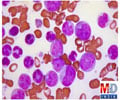A recent study based on clinical trials reveals a drug initially developed to treat some types of cancer now appears to help multiple sclerosis (MS) sufferers.

In one trial, patients who received the drug "were nearly half as likely to relapse within two years than those who received interferon", the most commonly-used MS drug, said a statement by The Lancet medical journal which published the research.
A second trial had similar results.
The outcome "offers the prospect of substantial improvement in quality of life and a better future for thousands of people with MS," said Alastair Compston from the University of Cambridge, principal investigator on both studies.
Many MS patients already use alemtuzumab, even though it has not been licensed for this purpose.
Both trials were Phase III, which is the final testing stage in a process to vet a new drug. Together, the two involved some 1,400 patients.
Advertisement
This affects vision, movement, balance, sensation, bladder control and eventually also memory and thinking.
Advertisement
There is no cure, and existing drugs seek to reduce symptoms, said the statement. Success of a drug is measured by a reduction in the frequency of relapses.
The researchers found that alemtuzumab, licensed to treat leukaemia, appeared to increase the risk of certain auto-immune disorders, particularly those affecting the thyroid, but said these could be treated effectively.
The Lancet, in an editorial, said the results were encouraging but added that there were concerns that licensing the drug for MS may lead to a rise in cost.
"More effective, affordable, evidence-based treatments with long-term benefits are desperately needed," it said.
"Finding promising treatments such as alemtuzumab is important. But so is keeping alemtuzumab accessible and affordable if its early success in these trials proves to be of enduring value."
Regulatory authorities in the US and Europe are likely to approve the drug for MS use during the course of 2013, according to University of Cambridge spokeswoman Genevieve Maul.
Source-AFP















